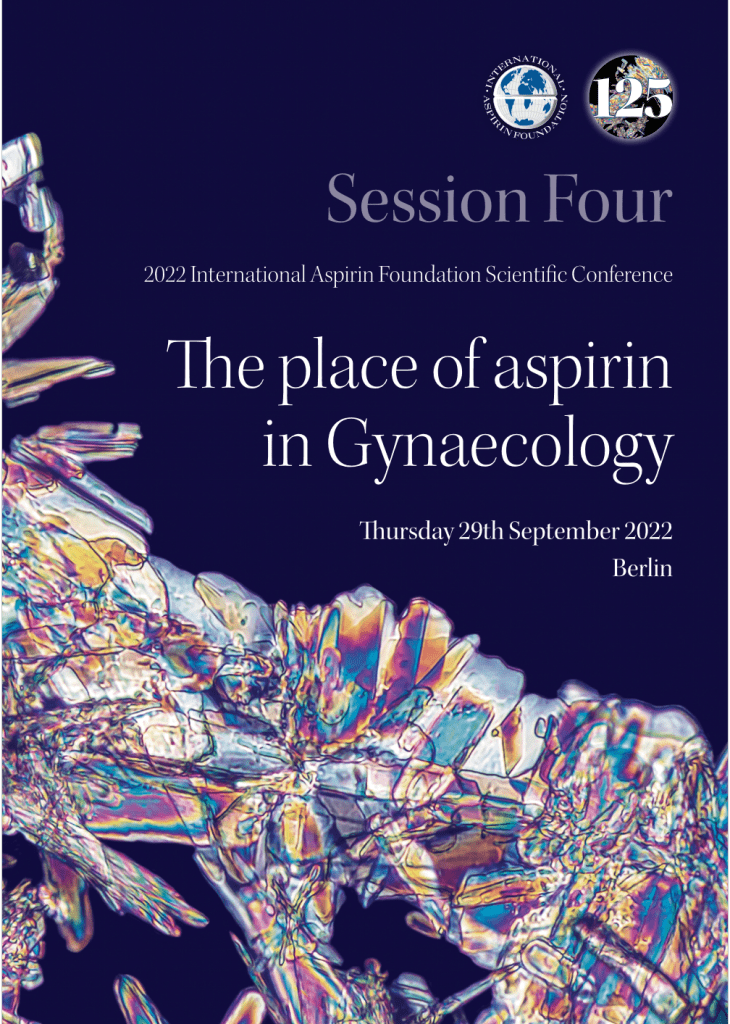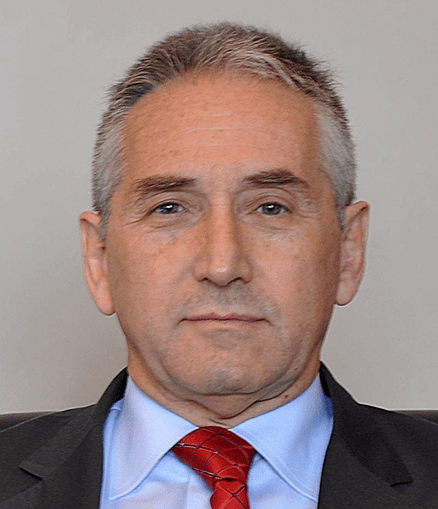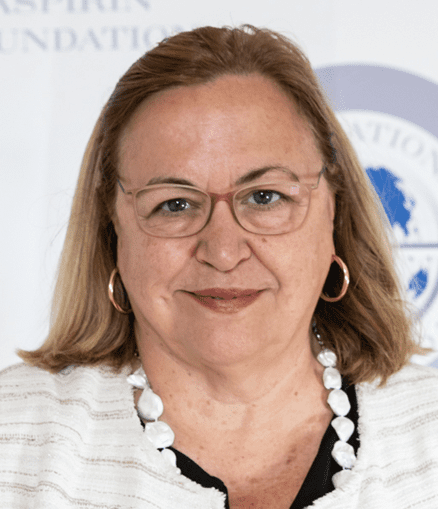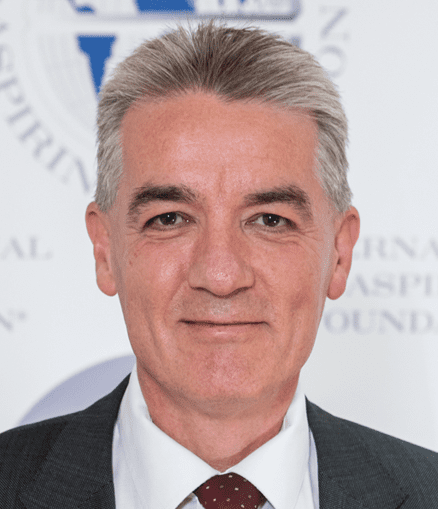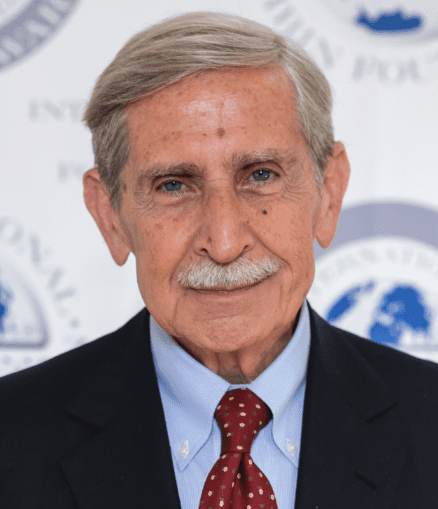The place of aspirin in Gynaecology
Chairpersons Carlo Patrono (Italy) and Lina Badimon (Spain)
The Place of Antiplatelet Therapy in Obstetrics and Gynaecology Elisa Llurba (Spain)
Pre-eclampsia is an important complication of pregnancy that brings an 83% increase in severe maternal disease and has a 78% association with intrauterine growth restriction (IUGR)/prematurity and foetal hypoxia. It presents with high blood pressure and proteinuria. The condition is character- ised by endothelial dysfunction with:
- Increased sensitivity to angiotensin II and norepinephrine
- Cyclocxygenase-1 with decreased PG12/TXA2 and vasoconstriction
- Increased endothelial-cell permeability and intravascular hypovolaemia
- Platelet aggregation
- An inflammatory response
- Coagulation activation
There is immunological interaction (HLA-NK), trophoblastic invasion impairment (IFNỿ, VEGF, PIGF,NO), placental ischemia, an increase in trophoblast debris, Increased sFlt-1, decreased PIGF and increased cytokines. Aspirin helps at lots of different points including the immunological interactions, the vasoconstriction, platelet aggregation and inflammatory response.
In 1978 the first case report of the use of aspirin to prevent recurrent pre-eclampsia was published1 and in 19852 the first randomised controlled trial was performed using aspirin to help prevent pre-eclampsia with positive results. In 2010 a meta-analysis3 was performed showing a 10% reduction in pre-eclampsia rate and a further study4 showed that the timing of the intervention before 16 weeks was important. In 2018 a dose of 150mg as well as the timing of aspirin initiation was shown to be appropriate5.
As a result, NICE6 recommend the use of aspirin 75-150 mg daily in pregnant women at high-risk of pre-eclampsia from 12 weeks until birth. They define high risk as women with:
- Hypertensive disease during a previous pregnancy
- Chronic kidney disease
- Autoimmune disease such as systemic lupus erythematosus or antiphospholipid syndrome
- Type 1 or 2 diabetes
- Chronic hypertension6
NICE6 also recommend that women with more than one of the following moderate risk factors for pre-eclampsia take aspirin 75-150 mg from 12 weeks gestation until delivery:
- First pregnancy
- Age 40 years or older
- Pregnancy interval of more than 10 years
- Body mass index (BMI) of 35kg/m2 or more at time of first visit
- Family history of pre-eclampsia
- Multiple pregnancy6
Identifying at risk women is important for prevention and taking a thorough maternal history along with biophysical parameters such as blood pressure at the scan appointment helps to identify 85% of at-risk women.
The ASPRE7 trial compared aspirin 150 mg daily versus placebo in the pregnancies of 1610 women who were at high risk of preterm pre-eclampsia. The aspirin group had an 82% drop in the rate of early pre-eclampsia and a 62% drop in the rate of preterm pre-eclampsia making it a worthwhile intervention.
Data from the ASPRE and SPREE trials7,8 showed that aspirin also reduces the number of small for gestation age (SGA) neonates with a 40% reduction in SGA <37 weeks and a 73% reduction is SGA at <32 weeks.
Major improvements have helped to reduce maternal deaths in the UK with 200 deaths per 10,000 population in the 1950s, 100 in the 1970s, 19 in 2006-2008, 10 in 2009-2011 and 2 between 2012 and 20149. These improvements in obstetric care have been due to:
- Fluid restricting management of pulmonary oedema
- Management of severe hypertension
- So4Mg-eclampsia
- Timely delivery
- Aspirin prophylaxis since 2010 in the UK
Aspirin is considered safe for women and their babies. Large cohort and case-control studies have reported that aspirin is not associated with an increase in risk of structural or developmental anomalies.
A study has shown that women on aspirin for other reasons improve their rates of pregnancy. As a result, a new randomised study is underway looking at different cardiovascular parameters before pregnancy and during pregnancy to see if aspirin can improve the cardiovascular state pre pregnancy and help women to get pregnant and to have a successful pregnancy.
In summary, pre-eclampsia is an important cause of maternal, foetal and neonatal morbidity and mortality. It still is one of the leading causes of maternal mortality and ASPRE has shown that using an algorithm to identify at risk women at the beginning of pregnancy and give aspirin at 150mg at night during the pregnancy reduced the rate of pre-term pre-eclampsia. There are still some controversies regarding whether aspirin could be used universally and if there are certain subgroups of women that will benefit from a combination of different drugs. Further studies to ascertain if aspirin will help to the reduce long-term effects of cardiovascular conditions during pregnancy are needed.
References
- Beaufils M, Donsemont R, Uzax S and Colau JC. Case report. Lancet, 2 (1978) p5.
- Beaufils M, Uzac S, Donsemont R and Colau JC. Prevention of pre-eclampsia by early antiplatelet therapy. Lancet. 1985 Apr 13:1(8433):840-2.
- Fox et al. BJOG 2010
- Bujold E Obs and Gynecol 2010
- Roberge AJOG 2018
- NICE guideline NG133 Hypertension in pregnancy: diagnosis and management. 2019. www.nice.org.uk/guidelines/ng133
- Rolnik DL, Wright D, Poon L et al. Aspirin versus placebo in pregnancies at high risk for preterm pre-eclampsia. N Engl J Med. 2017 Aug 17,377(7):613-622
- Tan MY, Wright D, Syngelaki A et al. Comparison of diagnostic accuracy of early screening for pre-eclampsia by NICE guidelines and a method combing maternal factors and biomarkers: results of SPREE. Ultrasound Obstet Gynecol. 2018 Jun;51(6):743-750.
- Shennan AH, Green M and Chappell LC. Maternal deaths in the UK: pre-eclampsia deaths are avoidable. Lancet. 2017 Feb 11 389 (10069); 582-584.
Round Table Discussion
Elisa Llurba (Spain), Carlo Patrono (Italy) and Lina Badimon (Spain).
It was agreed that aspirin is an inexpensive drug and there- fore the guidelines for aspirin in those at risk of pre-eclampsia are easily implemented globally. Work to look at how aspirin can help in the preparation of women for in vitro fertilisation is on-going and will be of increasing importance as women choose to become pregnant later in life. Cardiovascular dis- ease can appear in the fourth or fifth decade of life in women that suffered during the perinatal time. We need to prevent not only pre-eclampsia but also later cardiovascular disease in women.
The question of all pregnant women being treated with aspirin was raised and Dr Elisa Llurba replied that this needs considering as two scenarios. Firstly, in low- and middle-in- come countries that cannot perform screening giving aspirin to all pregnant women could be an option. However, in countries and settings where we can perform screening, it is better to identify women at risk for various reasons;
- Women can be made aware of the risk of such complications and that aspirin lowers the risk but does not completely exclude it
- Once identified these women can be followed up during pregnancy to ensure they are managed if they develop the pre-eclampsia
- Compliance is always related to the sensation of the risk. Folic acid also recommended during pregnancy is only taken by 20% of pregnant women because they don’t feel they need it. If they are not aware of the risk, they are less likely to take aspirin.
To watch a summary of the session click below

